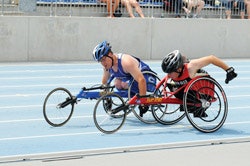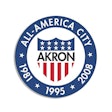Last October, Jordan Houdeshell won the first wheelchair cross country title in Iowa history, completing a 5,000-meter course with a time of 17:04, as enthusiastic spectators stretched 150 yards along either side of the finish line.
Last October, Jordan Houdeshell won the first wheelchair cross country title in Iowa history, completing a 5,000-meter course with a time of 17:04, as enthusiastic spectators stretched 150 yards along either side of the finish line. But after the race, the Linn-Mar High School junior from Marion said he wasn't crazy about that distinction: "This may sound kind of dumb, but I wish I wasn't the first," he told reporters, "because I wish there were more people doing it."
Log in to view the full article
Last October, Jordan Houdeshell won the first wheelchair cross country title in Iowa history, completing a 5,000-meter course with a time of 17:04, as enthusiastic spectators stretched 150 yards along either side of the finish line.
 PHOTO FINISH Drake Sachsenmeier (left) and Jordan Houdeshell race to the finish line in the 400 meters during the 2012 Iowa State Track & Field meet. (Courtesy Pep Rally Photo)
PHOTO FINISH Drake Sachsenmeier (left) and Jordan Houdeshell race to the finish line in the 400 meters during the 2012 Iowa State Track & Field meet. (Courtesy Pep Rally Photo)Last October, Jordan Houdeshell won the first wheelchair cross country title in Iowa history, completing a 5,000-meter course with a time of 17:04, as enthusiastic spectators stretched 150 yards along either side of the finish line. But after the race, the Linn-Mar High School junior from Marion said he wasn't crazy about that distinction: "This may sound kind of dumb, but I wish I wasn't the first," he told reporters, "because I wish there were more people doing it."
So do officials at the Iowa High School Athletic Association, which began making accommodations for wheelchair competitors in state track and field championships in 1990 but waited two more decades for a request to come from a would-be cross country participant. When it finally did in 2010, via Waterloo West High School, the IHSAA didn't hesitate.
"Our immediate response was, 'Let's get it done,' " says assistant executive director David Anderson, who attended four regular-season cross country meets in which Houdeshell participated on a sleek and low-to-the-ground three-wheel racing chair that looks more like a hand-powered cycle with gears. Because Houdeshell appeared to pose no threat of interference to the runners with whom he shared the course - and because the runners were cognizant of Houdeshell's presence - Anderson determined that reasonable accommodations could be made for wheelchair participation.
IHSAA officials made contingency plans to shorten the state finals course for Houdeshell and the only other wheelchair competitor, Comanche High School sophomore Drake Sachsenmeier. But neither boy nor their coaches deemed that necessary, and both raced on the same hilly, uneven terrain as able-bodied runners (although each was given a head start); no collisions or injuries were reported. "Our state meet course ends with about a quarter-mile downhill, and I can assure you they were both flying toward the finish line," says Anderson, former chair of the National Federation of State High School Associations' Track and Field and Cross Country Rules Committee. "There was no interference in any way with other runners. But it certainly raised a few eyebrows, and I think in years to come we will arrange the start of the wheelchair races far enough in advance of the runners so there won't be any involvement with other runners on the course."
Track and field attracts more wheelchair participants than any other sport, according to the Middle Village, N.Y.-based Wheelchair Sports Federation, but Iowa is believed to be the first state to crown a high school wheelchair cross country champion. "There are still some states that are resisting even having wheelchair events at their state track and field championships," Anderson says. "We weren't looking to start programs, but when schools and families identified the need, we responded. I think as more states get involved, students from other states will hear about them, come to their state associations and say, 'This is something you should be doing.' I don't know why other states wouldn't want to step up and do this."
Recently, a handful of states have stepped up and created the same competitive opportunities for wheelchair track participants that are available to able-bodied athletes - sometimes as the result of litigation.
In May, the Minnesota State High School League, which has independently sanctioned state titles for disabled student-athletes in multiple sports since 1993, agreed to double the number of track and field events for wheelchair athletes from three to six, as well as allow disabled participants to score points for their school teams. The changes were part of a settlement reached after Rose Hollermann, a sophomore at Waterville-Elysian-Morristown High School, sued the association, maintaining that wheelchair track should not be treated as an exhibition sport.
Less than one month later, the Ohio High School Athletic Association announced that wheelchair users will be allowed to compete in eight track events at the state championship level beginning in 2013. Separate championship finals for boys and girls will be held in the 100 meters, 400 meters and 800 meters, plus the shot put. Individual honors will be awarded but wheelchair competitors will not score points for their teams. "There are many athletes with disabilities that participate in sports, but often they are segregated from other athletes," Pam Patula, executive director of the Southeastern Ohio Center for Independent Living, told Lancaster's Eagle Gazette. "This will be a great way for them to participate at the same events and be with other athletes. It is all about inclusion."
While track and field is the first sport in which the OHSAA will include wheelchair athletes as part of a state championship, the Illinois High School Association basketball, gymnastics, golf, bowling, swimming, track and field, and cross country.
The Illinois program comes at the recommendation of a six-member ad-hoc committee comprised of school administrators that's been studying the issue since its formation (at the request of a member school) earlier this year. It also may have been spurred by a lawsuit filed by Illinois Attorney General Lisa Madigan in federal court in May, which asked for an injunction ordering the IHSA "to cease unlawful discrimination against athletes with disabilities" and to set state-qualifying standards for those athletes in individual sports. A spokesperson for Madigan told Chicago's WLS-TV that the announcement of the pilot program does not affect the lawsuit's status.
The state's initial two-year program allows the IHSA to continue evaluating statewide interest and participation among athletes with disabilities, while also giving them additional opportunities to compete in parallel events at sanctioned state finals beginning with the 2012-13 school year. The association will partner with advocates and various regional and community-based agencies that work with athletes with disabilities, as well as evaluate programs implemented in other states. "By piloting separate, high-profile events, we hope to spur more interest statewide," IHSA executive director Marty Hickman said in a statement, adding that he hopes the strategy will also increase awareness among coaches and physical education teachers. "As more and more student-athletes participate in our programs, and as they start to do so at younger ages, the level of competition naturally rises, giving way to more meaningful experiences for our athletes."
In 2008, Maryland became the first state in the country to pass legislation requiring schools to create equal athletic and physical education opportunities for students with disabilities. Anderson's not sure Iowa could feasibly do that in all sports - "Our numbers are so low, I don't think we could find two five-player teams representing two schools to have a wheelchair basketball game," he says - but he does predict participation increasing in track and cross country, the only two sports Iowa currently offers for students with disabilities. Houdeshell will be a senior this fall and Sachsenmeier a junior, and Anderson says both are actively recruiting fellow wheelchair athletes to the sports.
Meanwhile, the two racers met again in the 400 meters (but used a different style of chair) at the state track meet in May, with Houdeshell edging Sachsenmeier by about six inches in a wheelchair field that included three other boys and one girl. "The enthusiasm of the public-address announcer and the crowd was not just polite support," Anderson says. "It was true excitement about the competitiveness of that race, and it was one of the more exciting and gratifying moments for us as an association."



































